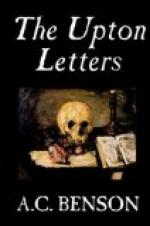for myself, I know that I work and think and hope
and fear too much, and that in my restless pursuit
of a hundred aims and ambitions and dreams and fancies,
I am constantly in danger of hardly living at all,
but of simply racing on, like a man intoxicated with
affairs, without leisure for strolling, for sitting,
for talking, for watching the sky and the earth, smelling
the scents of flowers, noting the funny ways of animals,
playing with children, eating and drinking. Yet
this is our true heritage, and this is what it means
to be a man; and, after all, one has (for all one
knows) but a single life, and that a short one.
It is at such moments as these that I wake as from
a dream, and think how fast my life flows on, and
how very little conscious of its essence I am.
My head is full from morning to night of everything
except living. For a busy man this is, of course,
to a certain extent inevitable. But where I am
at fault is in not relapsing at intervals into a wise
and patient passivity, and sitting serenely on the
shore of the sea of life, playing with pebbles, seeing
the waves fall and the ships go by, and wondering
at the strange things cast up by the waves, and the
sharp briny savours of the air. Why do I not
do this? Because, to continue my confession, it
bores me. I must, it seems, be always in a fuss;
be always hauling myself painfully on to some petty
ambition or some shadowy object that I have in view;
and the moment I have reached it, I must fix upon
another, and begin the process over again. It
is this lust for doing something tangible, for sitting
down quickly and writing fifty, for having some definite
result to show, which is the ruin of me and many others.
After all, when it is done, what worth has it?
I am not a particularly successful man, and I can’t
delude myself into thinking that my work has any very
supreme value. And meanwhile all the real experiences
of life pass me by. I have never, God forgive
me, had time to be in love! That is a pitiful
confession.
Sometimes one comes across a person with none of these
uneasy ambitions, with whom living is a fine art;
then one realises what a much more beautiful creation
it is than books and pictures. It is a kind of
sweet and solemn music. Such a man or woman has
time to read, to talk, to write letters, to pay calls,
to walk about the farm, to go and sit with tiresome
people, to spend long hours with children, to sit
in the open air, to keep poultry, to talk to servants,
to go to church, to remember what his or her relations
are doing, to enjoy garden parties and balls, to like
to see young people enjoying themselves, to hear confessions,
to do other people’s business, to be a welcome
presence everywhere, and to leave a fragrant memory,
watered with sweet tears. That is to live.
And such lives, one is tempted to think, were more
possible, more numerous, a hundred years ago.
But now one expects too much, and depends too much
on exciting pleasures, whether of work or play.
Well, my three persons in a garden must be a lesson
to me; and, whatever may really happen to them, in
my mind they shall walk for ever between the apple-trees
and the daffodils, looking lovingly at each other,
while the elder man shall smile as he reads in the
Chronicle of Heaven, which does not grow old.—Ever
yours,




